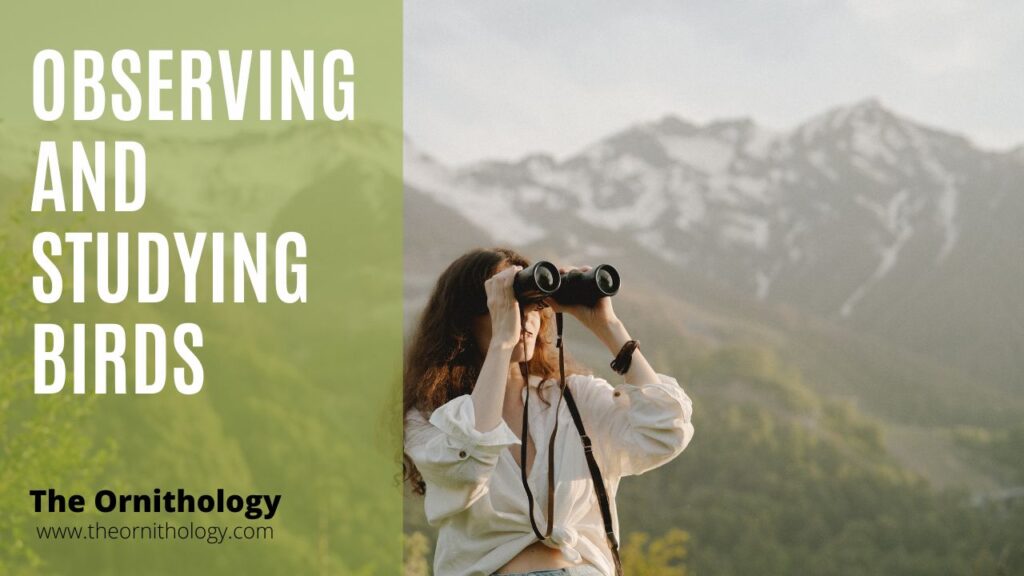Field Ornithology: Techniques and Equipment

Field ornithology involves studying birds in their natural habitats and requires specific techniques and equipment:
- Binoculars and Spotting Scopes: Binoculars provide magnification for observing birds at a distance, while spotting scopes offer higher magnification for detailed views.
- Field Guides: These books contain illustrations, descriptions, and range maps of bird species, helping birdwatchers identify the birds they encounter.
- Camera Equipment: Cameras with telephoto lenses allow birdwatchers to capture images of birds, aiding in identification and documentation.
Citizen Science and Bird Monitoring Programs
Citizen science involves ordinary people participating in scientific research, contributing valuable data to bird monitoring programs:
- Christmas Bird Count: This annual event involves volunteers counting birds within a designated area to assess bird populations and migration patterns.
- eBird: A digital platform that allows birdwatchers to record and share their bird sightings, contributing to a global database for research and conservation efforts.
- Nest Box Monitoring: Volunteers monitor bird nest boxes to track breeding success, chick development, and population trends.
Ethical Considerations in Birdwatching
Ethical birdwatching practices are important for minimizing disturbances and protecting bird populations:
- Respect for Habitat: Avoid approaching nesting sites or disturbing birds in sensitive areas, as this can disrupt their breeding and feeding behaviors.
- Use of Playback Calls: Minimize the use of playback calls to attract birds, as excessive use can stress the birds and affect their behavior.
- No Feeding of Wild Birds: Feeding wild birds can alter their natural behaviors, disrupt ecosystems, and spread diseases.
- Minimal Environmental Impact: Stay on designated paths, avoid trampling vegetation, and follow Leave No Trace principles to minimize your impact on the environment.
Observing and studying birds can be both rewarding and informative, but it’s crucial to employ responsible practices that prioritize the well-being of the birds and their habitats. Engaging in ethical birdwatching ensures that bird populations continue to thrive for future generations to enjoy and study.
Frequently Asked Questions (FAQ) – Observing and Studying Birds
What is field ornithology?
Field ornithology is the study of birds in their natural habitats. It involves observing bird behaviors, identifying species, and collecting data to learn more about their ecology, behavior, and distribution.
What equipment do I need for birdwatching?
Essential equipment includes binoculars or spotting scopes for observation, field guides for identification, and cameras with telephoto lenses for documentation. Comfortable clothing and footwear are also important for outdoor exploration.
What is citizen science in birdwatching?
Citizen science involves everyday people participating in scientific research. In birdwatching, citizen scientists contribute data to monitoring programs such as the Christmas Bird Count and eBird, aiding researchers in understanding bird populations and behaviors.
How does eBird work?
eBird is an online platform where birdwatchers record and share their bird sightings. The data collected contribute to a global database used for research, conservation, and monitoring bird populations and distribution.
What is the Christmas Bird Count?
The Christmas Bird Count is an annual event where volunteers count birds within a specific area during a designated time. This collective effort helps researchers track bird populations and migration trends over time.
Can birdwatchers use playback calls to attract birds?
While playback calls can be used to attract birds for observation, it’s important to use them sparingly and responsibly. Overuse can stress birds and disrupt their natural behaviors, so it’s recommended to use them judiciously.
Is it ethical to feed wild birds?
Feeding wild birds can have both positive and negative impacts. While it can provide supplemental food, it’s essential to use appropriate bird feed and feeders and to avoid creating dependencies that could harm natural foraging behaviors or lead to disease transmission.
How can I minimize my impact while birdwatching?
Minimize your impact by staying on designated paths, respecting bird habitats and nesting sites, avoiding trampling vegetation, and practicing Leave No Trace principles. Prioritize the well-being of the birds and their environments.
Can I approach nesting sites for observation?
It’s best to avoid approaching nesting sites, as your presence can stress the birds and disrupt their breeding behaviors. Use binoculars or spotting scopes to observe from a distance without causing disturbances.
How can I contribute to bird conservation through ethical birdwatching?
Engage in ethical birdwatching practices by following guidelines that prioritize the welfare of the birds and their habitats. Participate in citizen science programs, support conservation efforts, and educate others about responsible birdwatching practices.
